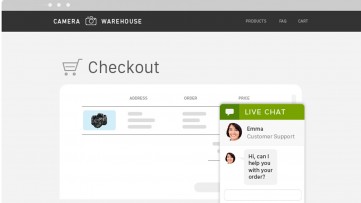

Top 30 Website Online Marketing Tips to rank your site #1
 By The Logic Box
By The Logic Box
 Added Wed, Nov 16 2016
Added Wed, Nov 16 2016
 By The Logic Box
By The Logic Box
Added Wed, Nov 16 2016

Hey, Thanks For Subscribing!
Please check for a confirmation message and ensure you add us to a safe email list.
If you don't see a message in the next five minutes, check your spam or junk folders and mark our emails safe for next time.
See you soon!
Duplicate Email Found!
Well this is embarrassing... It looks like is already registered.
We have just sent an email to that address with a link to manage the subscription with us. If you don't see a message in the next five minutes, check the spam or junk folders, it's definitely there.
See you soon!
If you didn’t already know, this week is National Small Business Week. This week celebrates all small businesses and what they do for consumers, the economy, and the country. And now that today’s consumers rely more on the Web to find and choose local businesses, online marketing has become a high priority on the list of things SMBs need to do.
But that list is often long and takes a while to sort through. So, here’s a roundup of some of our most popular blog posts with quick online marketing tips. From search advertising best practices to social media tactics, these are tips that any small business owner can use to help consumers find them online.
Tips for Great Search Advertising:
1. Know the Text Ad Format – All text ads aren’t created equal. Bing, Yahoo!, and Google all have slightly different text ad formats, so identify and follow the rules of each before running your search advertising campaign.
2. Optimize the URL in Your Search Ad – Text ads feature a URL along with the title of your ad, so make sure it’s relevant to the product or service you are promoting and that it doesn’t conflict with the publisher’s requirements.
3. Include Target Keywords in Your Ad – Use keywords in both your headline and text ad copy that match or are closely related to the keywords you bid in order to help your ad show up in search results for those terms.
4. Write a Strong Call to Action – Tell consumers who see your text ad what action you want them to take, like getting a free estimate or downloading a coupon, so they are more willing to click through to your site.
5. Use a Call Tracking Number – If you use a click-to-call extension in your ad, consider using a tracking number to identify the calls that come from your ads and to measure the results of your search advertising.
6. Don’t Include Your Business Name in the Ad’s Headline – Headlines have limited character space, so don’t waste it on your business name. You can include your business name in your optimized URL, and use your headline for more critical content.
7. Use Title Case – Capitalizing the first letter of major words is a text ad best practice. Just don’t go crazy with all caps. (NEVER go crazy with all caps.)
8. Include the Right Punctuation – Using correct punctuation in a text ad is mandatory at the end of your ad, but it can also be used within the rest of your ad to ask a question or make a point.
9. Don’t Use Trademarked Terms (Unless You Own Them) – This is just a no-no. You can bid on trademarked terms if they are relevant to your ad, but using terms you don’t own can go against the publisher’s requirements.
10. Don’t Use Unknown Abbreviations – Nobody will know that “WFWAM” means “We Fix Windows and More.” There are many ways to include your message in your text ad without using abbreviations that only you can decipher.
Tips for a Better Business Website
11. Update Your Website – It’s 2016, so your business website shouldn’t look like it’s still stuck in the early 2000s. And it’s about more than just looks. Best practices and Web standards change often, so a refresh can help you make sure your website is at the top of its game.
12. Make Your Website Mobile-Friendly – The 2016 Local Search Study from Neustar Localeze found that nearly 80% of local searches on a mobile phone ended in a purchase. If you’re website isn’t mobile-friendly, you are missing out on these local consumers.
13. Complete and Optimize Your Site’s Metadata – Metadata on your website (like title tags, descriptions, and alt text) is a critical component of your website’s SEO. Leaving it out can negatively impact how you show up in search results.
14. Create and Use a Business Blog – Blogging and your business should be best friends. Maintaining a business blog can help boost your site’s SEO; plus, it can set you apart from the competition and demonstrate your knowledge and expertise. It’s a win-win situation.
15. Optimize Your Website for Local Search – If your law practice only handles cases in Albuquerque, New Mexico, then it doesn’t do much good to get it seen by consumers searching for legal consultations in Crawford County, New Hampshire. Make sure your business website includes local information, like a phone number, address, and geo-targeted keywords so that local consumers call you.
Tips for Effective Search Engine Optimization:
16. Regularly Post Quality Content – Creating and promoting fresh, original, and sharable content on a business blog can help increase your visibility in search engine results pages (SERPs) because these social shares signal to search engines that your site is knowledgeable and relevant in a particular topic.
17. Be Present on Maps – This is especially applicable to consumers searching for your business on the go using apps like Google Maps and Apple Maps. Make sure they not only find you by claiming your local listings and making sure information like your phone number and address are correct.
18. Claim Your Google+ Local Page – Claiming and optimizing a Google+ Local page is key to showing up in Google Maps and Google’s local search results. Plus, this page provides users with important information like your phone number, operating hours, and ratings and reviews that they use when deciding whether to use your business.
19. Engage Your Social Media Fans – Social media is a great way to build your brand and interact with potential and current customers. Post engaging content frequently to generate shares and connect with consumers, which can positively impact the number of those who see your content.
20. Use Local Keywords – Include geo-specific keywords in your website, blog, and even social media copy to drive visits and interest from consumers in your area.
21. Generate Backlinks – High-quality links, such as those from influencers, are great for building your authority. Plus, they tell search engines that your business is credible, therefore ranking your website or other sites higher in search engines.
22. Get Positive Reviews – What people say in reviews matters to consumers. In fact, one study determined that 79% of consumers trust online reviews as much as they trust a personal recommendation. And as these reviews are visible in search results, having positive reviews with high rankings can help persuade interested consumers to give your business a chance.
23. Set Up Google Authorship – In addition to building your business brand, building your personal brand can be a great way to get new consumers. Google Authorship can help you do this.
24. Complete Your Business Information – Yelp is a great hub to host all kinds of information about your small business. From operating hours to business type to payment options to parking information, it’s a great way to help consumers find you and your business.
25. Post Realistic Images – Images speak volumes, and Yelp features them loud and clear. Post inviting and realistic photos of what consumers can expect when visiting your business.
26. Promote Positive Reviews – Since Yelp reviews are featured in local search results on all major search engines, generating great reviews is more important that ever. Plus, you can promote these reviews in other places, like your website and social media sites.
Tips for a Glowing Social Media Presence:
27. Think Before You Post – It’s becoming more impossible to take back what you say in social media (hello, screenshots). In order to keep yourself from putting your foot in your mouth, make sure to think before you speak, er, post.
28. Have a Social Media Policy – Social profiles for your business aren’t the end-all and be-all of your brand. Your employees also represent your brand, both in person and online. Having a social media policy today is important so employees know the rules and expectations for posting online as well.
29. Be Careful when Newsjacking – Staying in the know is a great idea for generating timely social content. However, if you jump in a conversation online without knowing the origin of the topic, you could risk looking like a social media newbie and potentially coming off as insensitive.
30. Stay Alert – Social media is the place where consumers voice their opinions about you, good and bad. Having alerts set up to notify you of mentions, comments, or messages can help you make sure you address situations before they get out of hand.
How does your small business use online marketing to reach consumers? Drop us a line if we can help with your Marketing.
If you didn’t already know, this week is National Small Business Week. This week celebrates all small businesses and what they do for consumers, the economy, and the country. And now that today’s consumers rely more on the Web to find and choose local businesses, online marketing has become a high priority on the list of things SMBs need to do.
But that list is often long and takes a while to sort through. So, here’s a roundup of some of our most popular blog posts with quick online marketing tips. From search advertising best practices to social media tactics, these are tips that any small business owner can use to help consumers find them online.
Tips for Great Search Advertising:
1. Know the Text Ad Format – All text ads aren’t created equal. Bing, Yahoo!, and Google all have slightly different text ad formats, so identify and follow the rules of each before running your search advertising campaign.
2. Optimize the URL in Your Search Ad – Text ads feature a URL along with the title of your ad, so make sure it’s relevant to the product or service you are promoting and that it doesn’t conflict with the publisher’s requirements.
3. Include Target Keywords in Your Ad – Use keywords in both your headline and text ad copy that match or are closely related to the keywords you bid in order to help your ad show up in search results for those terms.
4. Write a Strong Call to Action – Tell consumers who see your text ad what action you want them to take, like getting a free estimate or downloading a coupon, so they are more willing to click through to your site.
5. Use a Call Tracking Number – If you use a click-to-call extension in your ad, consider using a tracking number to identify the calls that come from your ads and to measure the results of your search advertising.
6. Don’t Include Your Business Name in the Ad’s Headline – Headlines have limited character space, so don’t waste it on your business name. You can include your business name in your optimized URL, and use your headline for more critical content.
7. Use Title Case – Capitalizing the first letter of major words is a text ad best practice. Just don’t go crazy with all caps. (NEVER go crazy with all caps.)
8. Include the Right Punctuation – Using correct punctuation in a text ad is mandatory at the end of your ad, but it can also be used within the rest of your ad to ask a question or make a point.
9. Don’t Use Trademarked Terms (Unless You Own Them) – This is just a no-no. You can bid on trademarked terms if they are relevant to your ad, but using terms you don’t own can go against the publisher’s requirements.
10. Don’t Use Unknown Abbreviations – Nobody will know that “WFWAM” means “We Fix Windows and More.” There are many ways to include your message in your text ad without using abbreviations that only you can decipher.
Tips for a Better Business Website
11. Update Your Website – It’s 2016, so your business website shouldn’t look like it’s still stuck in the early 2000s. And it’s about more than just looks. Best practices and Web standards change often, so a refresh can help you make sure your website is at the top of its game.
12. Make Your Website Mobile-Friendly – The 2016 Local Search Study from Neustar Localeze found that nearly 80% of local searches on a mobile phone ended in a purchase. If you’re website isn’t mobile-friendly, you are missing out on these local consumers.
13. Complete and Optimize Your Site’s Metadata – Metadata on your website (like title tags, descriptions, and alt text) is a critical component of your website’s SEO. Leaving it out can negatively impact how you show up in search results.
14. Create and Use a Business Blog – Blogging and your business should be best friends. Maintaining a business blog can help boost your site’s SEO; plus, it can set you apart from the competition and demonstrate your knowledge and expertise. It’s a win-win situation.
15. Optimize Your Website for Local Search – If your law practice only handles cases in Albuquerque, New Mexico, then it doesn’t do much good to get it seen by consumers searching for legal consultations in Crawford County, New Hampshire. Make sure your business website includes local information, like a phone number, address, and geo-targeted keywords so that local consumers call you.
Tips for Effective Search Engine Optimization:
16. Regularly Post Quality Content – Creating and promoting fresh, original, and sharable content on a business blog can help increase your visibility in search engine results pages (SERPs) because these social shares signal to search engines that your site is knowledgeable and relevant in a particular topic.
17. Be Present on Maps – This is especially applicable to consumers searching for your business on the go using apps like Google Maps and Apple Maps. Make sure they not only find you by claiming your local listings and making sure information like your phone number and address are correct.
18. Claim Your Google+ Local Page – Claiming and optimizing a Google+ Local page is key to showing up in Google Maps and Google’s local search results. Plus, this page provides users with important information like your phone number, operating hours, and ratings and reviews that they use when deciding whether to use your business.
19. Engage Your Social Media Fans – Social media is a great way to build your brand and interact with potential and current customers. Post engaging content frequently to generate shares and connect with consumers, which can positively impact the number of those who see your content.
20. Use Local Keywords – Include geo-specific keywords in your website, blog, and even social media copy to drive visits and interest from consumers in your area.
21. Generate Backlinks – High-quality links, such as those from influencers, are great for building your authority. Plus, they tell search engines that your business is credible, therefore ranking your website or other sites higher in search engines.
22. Get Positive Reviews – What people say in reviews matters to consumers. In fact, one study determined that 79% of consumers trust online reviews as much as they trust a personal recommendation. And as these reviews are visible in search results, having positive reviews with high rankings can help persuade interested consumers to give your business a chance.
23. Set Up Google Authorship – In addition to building your business brand, building your personal brand can be a great way to get new consumers. Google Authorship can help you do this.
24. Complete Your Business Information – Yelp is a great hub to host all kinds of information about your small business. From operating hours to business type to payment options to parking information, it’s a great way to help consumers find you and your business.
25. Post Realistic Images – Images speak volumes, and Yelp features them loud and clear. Post inviting and realistic photos of what consumers can expect when visiting your business.
26. Promote Positive Reviews – Since Yelp reviews are featured in local search results on all major search engines, generating great reviews is more important that ever. Plus, you can promote these reviews in other places, like your website and social media sites.
Tips for a Glowing Social Media Presence:
27. Think Before You Post – It’s becoming more impossible to take back what you say in social media (hello, screenshots). In order to keep yourself from putting your foot in your mouth, make sure to think before you speak, er, post.
28. Have a Social Media Policy – Social profiles for your business aren’t the end-all and be-all of your brand. Your employees also represent your brand, both in person and online. Having a social media policy today is important so employees know the rules and expectations for posting online as well.
29. Be Careful when Newsjacking – Staying in the know is a great idea for generating timely social content. However, if you jump in a conversation online without knowing the origin of the topic, you could risk looking like a social media newbie and potentially coming off as insensitive.
30. Stay Alert – Social media is the place where consumers voice their opinions about you, good and bad. Having alerts set up to notify you of mentions, comments, or messages can help you make sure you address situations before they get out of hand.
How does your small business use online marketing to reach consumers? Drop us a line if we can help with your Marketing.
Most Talked About Posts
Staff Picks
Now Trending
Our Newsletter
Duplicate Email Found!
Well this is embarrassing... It looks like is already registered.
We have just sent an email to that address with a link to manage the subscription with us. If you don't see a message in the next five minutes, check the spam or junk folders, it's definitely there.
See you soon!
Join Our Newsletter
Hey, Thanks For Subscribing!
Please check for a confirmation message and ensure you add us to a safe email list.
If you don't see a message in the next five minutes, check your spam or junk folders and mark our emails safe for next time.
See you soon!
Duplicate Email Found!
Well this is embarrassing... It looks like is already registered.
We have just sent an email to that address with a link to manage the subscription with us. If you don't see a message in the next five minutes, check the spam or junk folders, it's definitely there.
See you soon!










